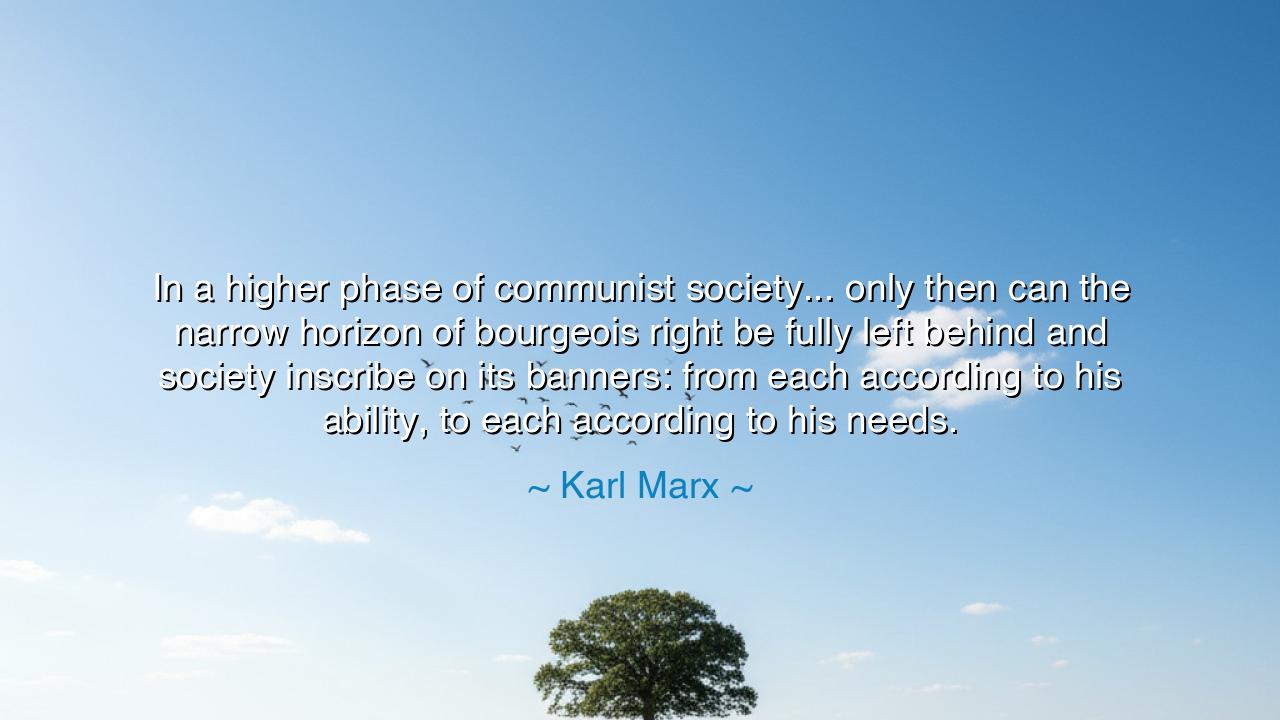
In a higher phase of communist society... only then can the
In a higher phase of communist society... only then can the narrow horizon of bourgeois right be fully left behind and society inscribe on its banners: from each according to his ability, to each according to his needs.






Hear the words of Karl Marx, written as prophecy and promise, carved into the memory of the oppressed: “In a higher phase of communist society… only then can the narrow horizon of bourgeois right be fully left behind and society inscribe on its banners: from each according to his ability, to each according to his needs.” These are not idle musings, but a vision of a world yet unborn, where justice is not measured in coins or contracts, but in the fullness of human dignity. Marx’s voice here is not only political—it is almost scriptural, calling humankind to rise beyond the chains of greed and the smallness of self-interest.
The origin of this phrase lies in Marx’s Critique of the Gotha Program (1875), where he warned his comrades against compromises that would leave inequality intact. He looked to a higher phase, a future beyond the early struggles of revolution, when scarcity would no longer dictate the structure of society, and the logic of the market would be replaced by the logic of compassion. To him, bourgeois right—the principle that each receives according to what they contribute—was still a prison, for it failed to account for the varied gifts and needs of human beings. A crippled man and a strong laborer may both contribute, but does the first deserve less life, less bread, less dignity? Marx thundered, “No!” For in the higher phase, contribution would not measure worth, and need would not mean shame.
Consider the early Christian communities described in the Acts of the Apostles. There, believers “had all things in common; and distribution was made unto every man according as he had need.” Though Marx wrote centuries later, the vision is similar: that human beings, freed from the tyranny of wealth and privilege, could live not by hoarding, but by sharing, not by suspicion, but by trust. Here is an ancient story that illustrates his dream—that a people, bound together, can abolish hunger, not by miracles, but by choosing to see one another’s humanity.
And yet, Marx’s vision is also a warning. The narrow horizon of bourgeois right still dominates our world, where paychecks determine survival, where the sick are punished with poverty, where the poor are told their suffering is their fault because they have contributed too little. In such a system, inequality perpetuates itself, and the banners of society bear not the inscription of justice, but of profit. To Marx, this was the tragedy: that a system built on rights and law could still enshrine injustice, because it treated human beings as units of labor rather than souls of infinite worth.
The meaning of his teaching, then, is not only about economics—it is about the very definition of justice. True justice is not giving to each what he has earned, for that assumes equality of circumstance from the start. True justice is giving to each what he needs, so that all may flourish together, and so that no one is cast aside as less worthy of life. Marx dares us to imagine this higher society, where ability is a gift given freely, and need is not a curse, but a claim upon the compassion of all.
The lesson is this: a society’s greatness is not measured by the wealth of its strongest, but by how it treats its weakest. If you have strength, use it for others. If you have wisdom, teach those who lack it. If you have wealth, share it to uplift the burdened. Do not measure life by the false scales of merit alone, for merit itself is shaped by privilege and chance. Measure instead by compassion, by solidarity, by the willingness to ensure that no brother, no sister, no child goes without bread, shelter, or dignity.
What then shall you do? In your own life, practice this higher law. Give where you can, not only when asked. Resist the voice that says, “He has not earned it,” and instead ask, “Does he need it?” Support systems in your community that lift the poor, defend the vulnerable, and challenge the worship of profit over people. And in your heart, write upon your own banner: from each according to his ability, to each according to his needs. For even if the whole world has not yet reached Marx’s vision, you may live as its citizen in spirit.
So let Marx’s words endure as a summons: society, bourgeois right, ability, needs. They are not merely the dream of one century but the challenge of every century. The horizon of justice lies before us, and though we walk slowly, though the path is long, it calls us ever forward. And when at last humanity heeds the call, then the banners of all nations shall bear that radiant promise, and the human family shall live not in division, but in shared abundance.






AAdministratorAdministrator
Welcome, honored guests. Please leave a comment, we will respond soon